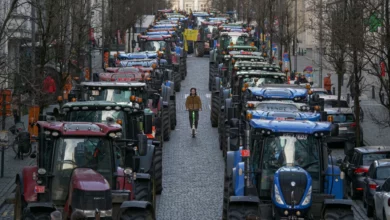On 11September, Egypt celebrated Farmer’s Day. But the dire straits in which many farmers find themselves call for anything but celebration. Strangled by poor market access, marginalization and general disregard from the authorities, many of the country’s 11 million farmers are either going bankrupt, losing their land or facing systematic violence.
They live largely out of sight of most urban dwellers so few in the city would understand the extent of their problems. But Egyptians who live in rural areas face serious dilemmas that are threatening their very existence and survival. The last 18 months have only served to exacerbate their problems, and hopes for a brighter future are dim.
More than 40 percent of those who live in the countryside live below the national poverty line of US$2 a day, according to World Bank statistics compiled before last year’s uprisings. For rural Egyptians — the majority of whom are small farmers who live off the land — economic statistics are simply a backdrop to the hardships and fear they live with, day in and day out.
Ray Bush, political economy professor at the University of Leeds in the UK and co-author of the book “Marginality and Exclusion in Egypt,” says the two biggest issues that threaten rural lives are land ownership and, more generally, access to resources. Other issues are administrative, involving agricultural loans, subsidies and market organization.
“Until there’s a flushing, systemic change throughout, from the big landowners to government, and right down to irrigation repairmen, nothing can really change,” says Bush.
Land wars have taken place for almost two decades now, after the enactment of Law 96/1992 granted pre-Nasserist landowners an almost incontestable right to take back their land. This fighting has resulted in hundreds of deaths per year and thousands of injuries and arrests.
“Since that law came about, landowners, government officials and thugs have continually sought out land and attacked resident farmers until they leave or are killed, despite the fact that they had been living and harvesting that land since the 1950s,” says Karam Saber, director of the Land Center for Human Rights.
Former Agriculture Minister Youssef Wali, who is now in jail, was at the forefront of aggressively enforcing the new land reclamation policies. At the same time, he dissolved cooperatives — the only real, empowering tool small farmers had to fight back.
Sons of the Soil, an NGO formed in 1997 by farmers who lost their land, estimated in 2010 that at least 270 small-scale farmers had been killed due to land disputes.
Saber says that over the past 18 months, these numbers have been increasing significantly.
“While the law is caught up trying to punish corrupt land deals of the old regime, more business owners and thugs are going in and abusing small farmers to take more,” he says.
Some farmers have tried to take these issues to court, but most small-scale farmers don’t have the money, time or health to persist in losing legal battles, says Saber.
Land disputes have displaced millions of farmers from their land, to the point that 47 percent of farmers now operate on less than a feddan, and 90 percent on less than five.
Many farmers have also been displaced just before their land yields its crops, leading to continued bankruptcy.
But despite the constant limbo regarding farmers and land insecurity, Mahmoud al-Mansy, media spokesperson for the Sons of the Soil, says most farmers have accepted land insecurity as an occupational hazard.
“For most small farmers, it’s the only skill they have because generations upon generations have invested their lives in agriculture,” says Mansy.
But land insecurity aside, Mansy argues that there are endless problems that face small-scale farmers.
“Even if you manage to find land to grow your crop, small farmers face poor access to inputs — seeds, fertilizers, pesticides, etc. — and don’t have equal and proper access to markets,” he says, adding that poor sanitation and access to clean water is now also becoming a pressing issue in rural areas.
“A farmer might sell all of their family jewelry just to buy the proper fertilizer and seeds, only to find out that it doesn’t work or they can’t sell the goods for a sustainable price. This results in families going completely broke even when they have land,” he adds.
Going bankrupt in rural Egypt often means that small-scale farmers must resort to indentured labor. The farmers either rent themselves or their families out to work for larger farms, if they are lucky, or be contracted out to traveling labor gangs to work in poor conditions for very little or no pay.
“If a farming family can’t feed themselves — and is without other skills, including literacy — the only option is to nomadically contract themselves with the hope of finding a way,” says Mansy.
Adel Beshai, professor of agricultural economics at the American University in Cairo, says he thinks a major part of rural poverty stems from agricultural markets being monopolized by large farm owners and policies that don’t encourage inclusive growth.
“Prices are unfairly controlled by businessmen and large farmers who then sell agricultural goods to European countries for low prices,” he says. “That money doesn’t trickle down, and so small farmers have to compete by selling their product at severely undervalued rates.”
Another pressing concern that adds to rural poverty is unpaid debts owed to the Agricultural Credit Bank. Beshai says he thinks many small farmers looking to borrow money to purchase land are conned into signing contractual agreements with compound interest rates that they don’t understand, resulting in many farmers owing up to 20 times the initial borrowed value.
“It would take a single farmer several lifetimes to pay off debts with these interest rates, assuming they don’t later get kicked off the land and can then access the right resources,” says Beshai, who adds that the credit bank was another money producer for the former regime.
Partial debt forgiveness for these farmers has continually made headlines, both now and during the Hosni Mubarak era, the latest being former Prime Minister Kamal al-Ganzouri’s promise to enact it last December, and President Mohamed Morsy’s promise last month. But these promises have not been fulfilled and little is expected to change.
“But even assuming debts were to be completely forgiven, it hardly alleviates the multifaceted problems that continue to destroy the lives of rural communities,” Beshai says.
Agriculture continues to comprise 15 percent of the country’s gross domestic product — more than twice that of tourism.
But with all the difficulties facing rural Egypt and its farmers, many are beginning to wonder what lies in store for them and whether anything can be done to improve the livelihood of the country’s largest demographic.
Most agriculturalists and farmers have by default adopted an inexhaustible optimism toward rural issues, but in practical terms, many are disillusioned and pessimistic.
Cooperatives and unions used to be farmers’ saving grace, as they were able to lobby for rights. While farmers are now allowed to form cooperatives, after Mubarak’s ouster, there is still relatively little they can do.
“There’s no point for a cooperative to lobby if there’s nobody sympathetic to lobby to,” says Saber, explaining that even in newer governments, most officials benefit more from larger landowners in the short term.
“It has actually drained small farmers even more and increased their disillusion,” he says.
Though it is still arguably too early to judge whether Morsy or the new agricultural minister, Salah Mohamed Abdel Momen, will implement policies, laws and strategies that encourage inclusive growth, many think positive change is highly unlikely. This is partly because of continued rhetoric from Morsy that praises rural Egypt, but often without any strategic follow-through.
Many solutions continue to float around, such as ensuring proper land distribution, halting agricultural privatization, encouraging cooperatives instead of officials, and offering direct farming subsidies — many of which the Brotherhood is allegedly against. However, most agree rural areas suffer from a lack of long-term vision and strategic bankruptcy.
“There are headlines, but there is no strategy for reconciling the rural disconnect,” says Bush, the University of Leeds professor, who thinks agricultural reform is unlikely. “There are plenty of ‘whats’ but there are never any ‘hows,’ which is the real challenge.”
Bush maintains that what successive governments in Egypt fail to understand is that the country’s massive rural population just might be its biggest asset.
“New governments need to establish a strategic vision that can translate large rural populations into a national resource that promotes inclusive growth, rather than a hindrance to the economy to be overcome through economic attitudes like privatization,” he says. “However, that requires strong political will for a thriving, balanced economy, which doesn’t seem to be on the agenda for the current government.”
This piece was originally published in Egypt Independent's weekly print edition.



